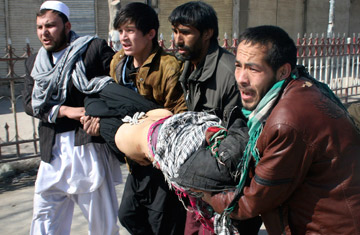
Afghans carry a wounded man during an anti-U.S. demonstration in Kunduz, Afghanistan, on Feb. 25, 2012
(2 of 2)
Smith says that NATO troops "get on a plane at a NATO base in the U.S. or Europe and fly to a NATO base in Afghanistan, and they never really engage with the Afghan population. Also — and this is the chicken-and-the-egg question — because of force-protection measures, soldiers can't get out there and win hearts and minds, and because of this, more soldiers die. And the more that soldiers die, the more force-protection measures there are — and they interact even less. We've just driven a wedge between ourselves," Smith says, echoing feelings and observations expressed in numerous conversations TIME has had with analysts, observers, service members, officers and security contractors over more than two years in Afghanistan.
The Saturday attacks seem to verify the findings of a declassified — then reclassified — U.S. Army study titled A Crisis of Trust and Cultural Incompatibility, which was released in May 2011. Through hundreds of interviews with both Afghan and American service members, it found that the murders of NATO troops by Afghan troops "do not represent 'rare and isolated events' as [is] currently being proclaimed." Afghan soldiers cited night raids and home searches by foreign troops, the lack of respect for women, indiscriminate shooting, constant cursing and arrogance as top complaints against their foreign "partners." They also said failure to prosecute foreign troops for war crimes, disrespect for Afghan soldiers, poor logistical support and a failure to share information led to divisions between the two forces — among numerous other complaints that included entering mosques, eating in front of fasting Afghan soldiers during Ramadan and other episodes of the desecration of the Koran.
At the same time, the report noted that U.S. troops have an extremely low regard for their Afghan counterparts. The service members' top complaints were that the Afghans were drug abusers, thieves, traitorous, unstable, incompetent and had poor officers and noncommissioned officers. The troops also said Afghan recruits lacked discipline, were dangerous in firefights, were cowardly, lazy and had poor hygiene.
The report concludes that "the rapidly growing fratricide-murder trend committed by Afghan national security force [ANSF] personnel against NATO members" confirms the "ineffectiveness [of] our efforts in stabilizing Afghanistan, developing a legitimate and effective government, battling the insurgency, gaining the loyalty, respect and friendship of the Afghans [and] building the ANSFs into legitimate and functional organizations." The report says that these complaints and murders challenge the usefulness of the "partnering" concept. "This is all the more a paradox given [NATO's] assumption of and planned reliance [on] the [ANSF] to be able to take over the security burden before it can disengage from this grossly prolonged conflict."
Despite that, the U.S. and NATO have always painted the partnership in positive terms. In a message issued on Saturday, the NATO commander in Afghanistan, General John Allen, thanked the Afghan military "for the sacrifices they have made this week to minimize violence throughout the country," and added that "for many years, these brave ANSF soldiers and policemen have stood together alongside us, shoulder to shoulder, shohna ba shohna, in dutifully seeking to protect the Afghan population from a merciless insurgency." That message was released before the two U.S. troops were killed. On Saturday, NATO pulled back all of its troops from their mentoring roles in Afghan government ministries, a significant move that NATO spokesman Jacobson described to TIME as "temporary" — but one that is bound to have far-reaching ramifications over the coming year.
